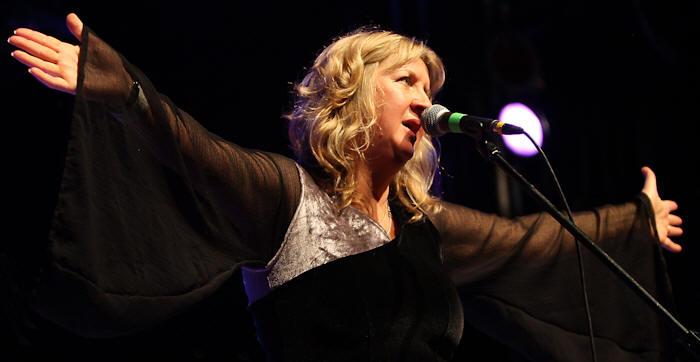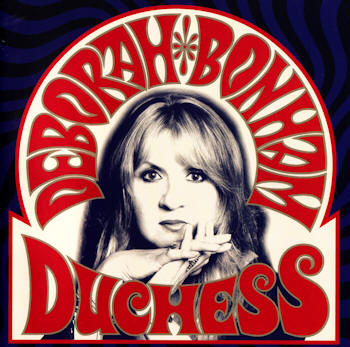
Painting © 2004 Loz
Arkle
Website
© Copyright 2000-2011 Alan White - All
Rights Reserved
Site optimised for Microsoft Internet Explorer



Early Blues Interview
|
|
The younger sister of the late John Bonham (drummer with Led Zeppelin) and Michael Bonham (disc jockey, author and photographer), Deborah was encouraged by Led Zeppelin's vocalist Robert Plant to record her first demos at the age of 17. Her first record deal saw the release of the critically acclaimed 'For you and the Moon' reaching the top 5 in the UK NME charts. With her established band, she has toured the UK and Europe over the years, and has had successful trips to the US. More recently she has released several CDs with notable guest musicians and performed at major UK blues festivals. I had the pleasure of meeting Deborah and her band at the recent Colne R&B Festival. _________________________________________________________________________
Deborah: The house was full of music all the time because of both my brothers, John and Michael. John was 14 years older than me and Michael was 12 years older so when I was really little they’d be playing Motown and all the soul stuff, and my parents were Big Band fans so there was a lot of Tommy Dorsey, Gene Krupa and Harry James, all of which John used in his drumming too. Music was everywhere. Apparently my Mum went to a Big Band dance when she was carrying me and she said that as soon as the music started, I was moving. We have various cine films of me dancing when young as soon as the radio went on and music was just always in the house. It went on as John got further along the line and got into the hippy stuff, with his loud coats and an afro and he’d stand and wait for the bus in the local village at Hunterend, and my Mum would walk on the other side of the street. All the old ladies used to come down and say, “Oh, he’s a lovely lad that boy of yours” and he’d be stood there with a big Hendrix hairdo and purple trousers. Alan: Did you always want to become a musician? Deborah: Yes. I think it started when I saw Zeppelin play at Bath Festival and then really at the Town Hall. Alan: I was there! Deborah: Yeah? I was very young. I remember watching them at Birmingham Odeon when the Mellotron broke down and I remember sitting there thinking, “What a great way to earn a living, I want to do that!” I’ve been trying to do that ever since but it hasn’t quite come as quickly as it did for Led Zeppelin but there you go, it’s about the music. Alan: How did you get started in music? Deborah: I did opera at school and went to various school competitions where I was always the main singer and I went to Kidderminster Convent Girls School and my Reverend Mother would have been absolutely horrified now. She passed away thinking I was going to be a famous opera singer. She said to me one day, “Now Deborah, what will you be doing when you leave the school?” And I said, “I think I’m going to sing”. “Not that terrible stuff where they wear the jeans?” she fired. “Oh no Reverend Mother”. At the time I had an Ian Dury badge on that was his head and shoulders in green but we weren’t supposed to wear any badges and she looked at it and said “Is that the Irish shamrock you’ve got there?”. “Yes, Reverend Mother”. I swear I’m not going to get into heaven – she’s going to waiting for me! Alan: So how did you make the move from opera? Deborah: Well, from there I had quite a struggle with John about it because he didn’t want me to do it at all. I think now, but I didn’t see it at the time, that he saw a side of the business that he didn’t think was any place for his little sister. Not only that but it was predominantly male then – well, it still is really. It’s not easy being female and trying to do this. John saw the very bad hedonistic side in the ‘70s. Mind you, things have changed and we went to bed at 11pm last night! He was adamant he didn’t want me to do it so I did study really hard at school, doing languages. I think I wanted to be a linguist although I don’t really know and I just kept saying, “Yes, whatever”. It wasn’t until he died that I thought about it and I thought I just want to try it, just to see, so I rang Robert Plant up and told him that I just wanted to see if I could sing and went over to his house. We did a demo and it went from there really. Robert said that I needed to be very careful because of the Led Zeppelin thing so I sent out my demos anonymously and got a record deal with Carrere Records. It sort of was wise, but it also wasn’t because I then thought I’ll do this on my own and I absolutely screwed it up. If I’d had some heavy weight behind me then things would have worked out. I didn’t screw it up but I got ripped off all the way along and put into music that I didn’t want to do. My heart was more into folk blues then, I loved Crosby Stills and Nash, Joplin, Al Green, Aretha Franklin, Otis Redding but I ended up getting pushed into 80s rock with my first album, For You and the Moon but my heart wasn’t really there. I was sent to Germany and the record company ripped me off and I couldn’t get out of the deal for 10 years. In some ways, I suppose it was for the best because if things had taken off for me I probably would have gone down the wrong road. John’s death and the terrible effect on me would have meant I certainly would have gone wrong and ended up a mess if I’d that success and access to that amount of money. The fact was that I had to get out and go out to work and deal with it that way and that made me paid my dues on the stage. I couldn’t record so I got a band together and realised that the live work was what I really did love. You’ve got to pay your dues on the stage. You can’t just say, “I’m going to do a demo and then I’ll get on stage and sing”. You just wouldn’t know where to start. In a lot of respects I don’t look back with any bitterness and I see it as a very positive thing – I’m still here!
Deborah: For my singing, it would be Maggie Bell. She was signed to Swan Song so when I was 14 or 15, Maggie won Best Female Vocalist in the Melody Maker awards. She did an album called Suicide Sal and I’ve just put one of those tracks, Chains, on Duchess and I’ve dedicated it to her because to me she was just fantastic. Her and Elkie Brooks, but Maggie had the Janis Joplin belter going for her and she had the soul and the black blues influence. For songwriting, it’s across the board including Crosby, Stills & Nash, Neil Young, Fleetwood Mac, Little Feat, Steely Dan, Led Zeppelin and then back to Robert Johnson and John Lee Hooker. Alan: Concentrating just on blues artists, who are your favourite blues men? Deborah: Blues men? I’d probably go more on the blues women and I absolutely love Mahalia Jackson. I love the old stuff like Bessie Smith, Lena Horne, Sister Rosetta Tharpe and, of course Billie Holliday. I just loved her fragility when she sang, it was just...oh dear! For the blues men, I guess it always ends up back at Robert Johnson, but I love BB King too. Alan: Be was in England a couple of months ago and we went to see him. Two and a half hours on stage and I was nearly crying, it was amazing. Deborah: No! We missed it and Pete was crying because we couldn’t go. And of course Les Paul died last week and Pete’s been trying to get over to New York to see Les Paul for ages. Alan: I missed Lonnie Donegan when he appeared at Colne Festival and then he died shortly afterwards and I was so upset. Deborah: I toured with Lonnie. He was actually the start of it all. My brother, John, absolutely loved Lonnie. When they were kids Lonnie Donegan was taking it somewhere new. When Lonnie phoned me up he’d heard my album somewhere and decided that he wanted this girl to come and sing so he called and asked me to do support. I was saying, “They’ll hate me Lonnie, it’s a whole different type of music” and he went, “Don’t worry about it. They’re a load of bloody boring old farts. Let’s spice ‘em up”. I don’t know what age he was but he was incredible and he wasn’t having these old folk just wanting “Does your chewing gum stick on the bedpost”, no, he wasn’t doing that. He wanted to really get into blues stuff. Alan: Leadbelly and Rock Island Line? Deborah: Absolutely! That was a treasured moment for me. Alan: I think I know the answer to this, but for the record, are there any particular songs that have special meaning for you? Deborah: Yeah – The Old Hyde of course. I don’t know how I wrote that, I was just lying in the bath and I shouted down to Pete that I needed a pen and paper and it just came. Within 5 minutes the whole lot was written. I just felt that it wasn’t me but it just came through me. People will probably think that’s nonsense but that’s how it felt. Of course because it’s the house that John bought and my Dad built it with him and Michael worked on it as well and then we lived there. Then of course John died, and then my Dad died. Alan: It wasn’t long between all three deaths really? Deborah: No, it wasn’t. I don’t think my Dad ever really coped with John’s death. It was a tough one. Alan: When children go, it doesn’t seem right. Deborah: He didn’t witness losing Michael but my Mum lost both her boys. I think she would have given up but because of me she had to cope. I’d lost John, found my Dad dead and then Michael died and so Mum didn’t have a choice. She had to be with me. She’s quite strong and we live together but there’s not a day when you don’t think about it. But time does heal, you never forget but it does help. Alan: Perhaps also, with you being a musician you are able to express yourself? Deborah: Yes, that ‘s a major part. I’m able to get it out instead of bottling it up. I don’t want to write doom and gloom songs about death but your experiences....well, it’s the blues. I’ve had some purist festivals refuse to put me on because they say I’m not blues enough. But how do you quantify blues? Blues is a feeling, it’s a whole whatever you’ve gone through and it’s not just a 12 bar song.
Deborah: No, possibly not. I don’t think I have one particular favourite really. Each one is, when I write it. Alan: They’re all your babies. Deborah: Exactly. It’s always, “I’ve got the best song...this is the best song I’ve ever done”. And of course I write with the lads so they’re all involved and we’ll say, “This is the best song we’ve ever written” and then another one comes along and it’s “This is the best song...” Alan: Tell me about your trips to the US. What impresses you about the States? Deborah: We’re going on March 2nd for 4 weeks. We’ve just got an agent out there and I think we’re starting at BB Kings in New York so I’m really excited about it. A Red Entertainment agent has taken us on board, which I’m thrilled about. It’s been tough to find an agent but they love the stuff and so we’re out there in March. I can’t wait. I don’t think there’s any particular big difference to playing in America or playing here because I’ve started to notice over the past year especially here that there’s a lot of people starting to come to gigs. The gigs are packing out and the demographic is just across the board. I don’t know if it’s because we’re starting to get a name on the live front but I’m hoping that’ll happen in America too. Alan: You’ve done Cropredy twice I think? Deborah: Yes, I love Fairport Convention. And Dave Pegg is on the Chains track. He was one of John’s best friends. There are about 20,000 people at Cropredy, all folk people, and I was stood backstage thinking, “Oh no, they’re going to hate us” but we went down an absolute storm. We sold 250 albums and there was still another hour’s worth of queue. We expected to sell 40 on a good day. Fantastic!
Deborah: Crikey – 25 years ago! I’ve been with Ian since I was 17. He came to Robert’s with me and we did these demos and my little nephew Jason was 13 at the time and he paid the drums. He’s gone on to do particularly well for himself! I’m married to Pete and we’ve been married for 20 years. Gerard (G) joined us about 10 years ago and of course we had Jerry Shirley on drums for 7 years. He’s just retired and Birlie stepped in and Birlie’s pretty in. And Jerry keeps an eye on us from a distance with a once-a-week phone call. Alan: I’ve got a quote here: “There are touches of Janis Joplin, shades of Bonnie Raitt in her sound, a rare gem of a voice”. These are accolades for your Duchess album, which I have to say is absolutely fantastic. Tell me about the making of it. Deborah: We made it at home. We brought in a studio which was great – we just turned our house into a studio. Mum lives there and we’ve got a couple of rescued dogs and a couple of rescued racehorses so I didn’t really want to go to London. We brought in the producer, Glenn, with his equipment and off we went. We’ve got a barn which turned into a studio where we recorded all the drums and set the band up. It was very relaxed, had moments of absolute fraughtness where we all fell out and everybody threw their toys out of the pram but then they all put them back in and it was all fine. You’ve got to have a bit of that to create the tension for the record, otherwise it’s too relaxed. You need a bit of passion going on. Alan: Tell me about your charity. Deborah: My racehorse sanctuary! We take in racehorses who have finished their career for whatever reason, perhaps injured or just haven’t got the aptitude, and we rehabilitate them into domestic riding horses and we rehome them on a permanent loan basis so we always keep an eye on them. They never end up back in racing or in sales for horsemeat. And the ones that we can’t rehome we keep. At the moment we’ve only got four permanent residents and we’ve rehomed about 20. We’ve got 20 in being rehabilitated at the moment and about 60 waiting to come in. Alan: That’s a marvellous thing you are doing. Deborah: I got involved in it years ago and I’ve always loved horses. I got involved with Graham Oldfield and Susan Collins, who are hands-on and run the whole thing and it’s Graham’s brainchild really. I got involved when I rescued my horse, Jack. We got involved in the Sanctuary idea because they are just disposable. The industry is quite horrific. It really should be down to the industry to provide money for this. We shouldn’t have to go out and raise money, especially as it’s the most difficult charity to raise money for. People look at me and say, “Wait a minute, this is the sport of kings. Billions are spent on it”. The Racing Board has now had so much pressure about these horses, especially after Despatches did a programme, that they thought they’d better do something about it and they set up a charity called “Retraining of Race Horses” which does collect a lot of money. But they don’t pay it out. We’re in a difficult position because we don’t want to alienate them. We need the trainers and the horses not to dump these horses but to let us take them. Some of these horses have a syndicate, suddenly it can’t race and they don’t care. In a world where we trying to promote environmental awareness and recycling, it’s a nonsense what happens. But we’re fighting it and we’re going to have open days for example inner city young people and children with autism. Without being too hippy-dippy about it, it’s bringing them to realise that the horses on the television or in the betting shops are real animals. We have an autistic lad that helps to groom and muck out and one of the horses that Pete and I rescued (Lift and Load, won the George V Cup in 1990) who is a difficult chap and never been rehomed, but young Hayden has a total affinity with him. Horses have a very positive side for people with autism or disabilities and we’re moving more into that as well, which is quite lovely to see. Alan: Just coming back to the Colne R&B Festival now, have you any comments on it. Deborah: Loved it! Absolutely loved it. Bit too much actually, had a headache this morning! The audience were fantastic, the management of the stage, the organisation, the people working it – everything. But the sound guys were faultless. I’ve done some festivals but this really knocked me out. And the whole organisation of it was just right. Very professional but lovely. Alan: The punters are passionate about Colne. Deborah: I’ve never done it before and I’ve wanted to do it for years so when I got the call I was, “Great, yes!” When we got there and there were a few people milling about in the audience, I thought “Oh no, it’s going to be dead and we’re on at 3.30 and there’s nobody here”. But it was heaving and I couldn’t believe it! The audience were really passionate. I didn’t really know how we were going to be accepted because we are blues-rock and doing all our own original material. That’s always difficult because people have to take it on board, but the reaction was incredible and I was quite tearful when I came off. And when the chanting started, I couldn’t believe it. Alan: On behalf of all the punters, can I thank you. It was just fabulous. You are really becoming one of the UK's finest blues-rock vocalists. Really, everybody I speak to says your voice is fantastic. Deborah: If people are enjoying it as much as we do, then that’s what it’s all about it. We get on the stage and we have a ball so if people can enjoy it as much as we do then we’re getting there. Alan: You certainly are getting there. Thank you so much Debbie. Deborah: Thank you Alan. And good luck with the website and everything you are doing.
_________________________________________________________________________
See the Deborah Bonham Band at the Butlins Rock &
Blues Festival, Skegness in January 2010:
Return to
Blues Interviews List |





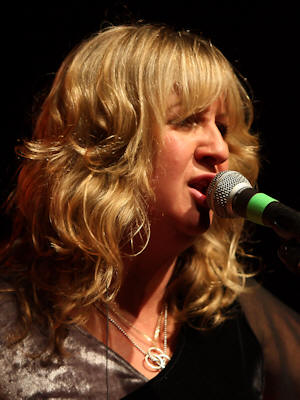 A
A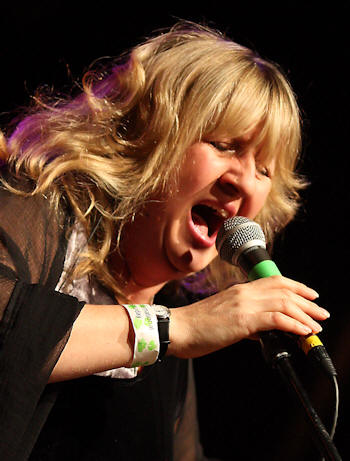 A
A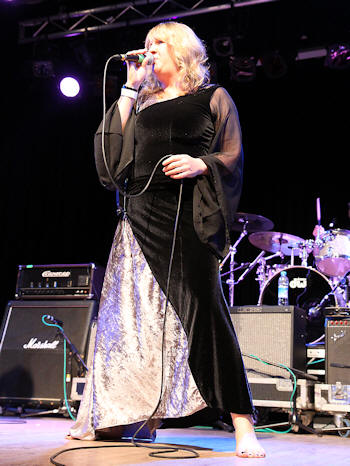 A
A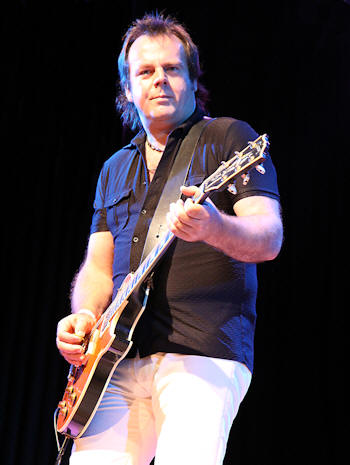 A
A